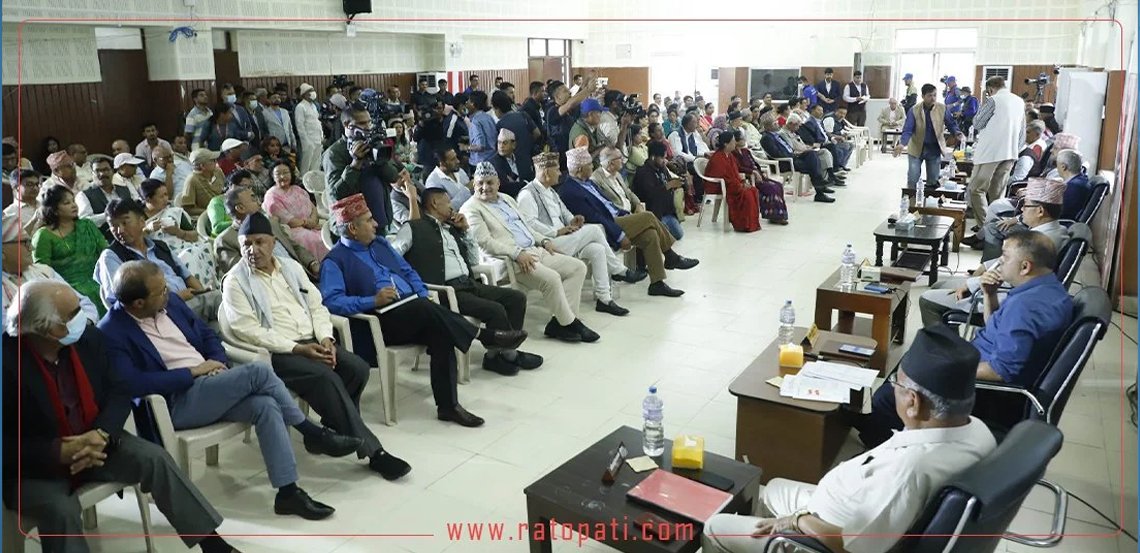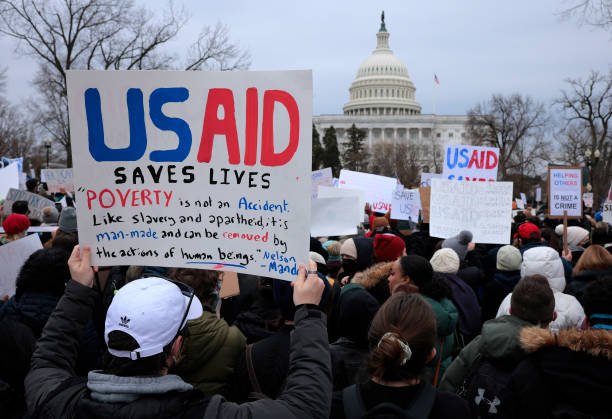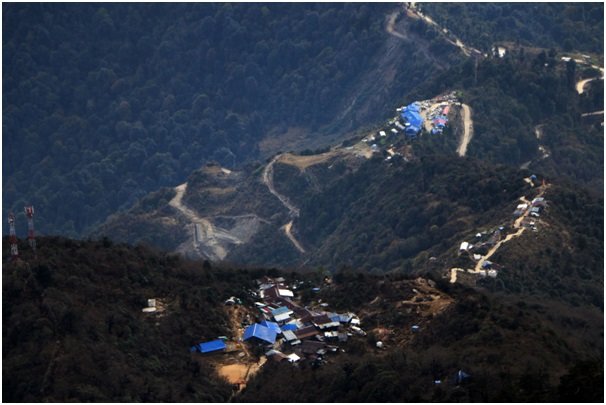Nepali Congress Meeting and unanswered query

Over the last eleven months, many significant events and decisions have taken place in the political landscape of Nepal. In light of this, the Nepali Congress Party Central Committee concluded on July 27. The meeting was being held live for the first time in Nepalese political history by any political party, therefore the large audience anticipated it in a number of ways.
It was widely believed that the meeting would reveal the Nepali Congress' position on several global, domestic, and even policy-development concerns but it catapults in a different direction. It was split vertically into two groups and members of the central committee were urged to contrast their opinions within each bloc. This gathering would have opened the door to challenging a long-standing political dissent among the populace on several significant topics. This meeting could also have navigated different agendas which could have impacted the people and the politics at large but NC failed to capitalize on the opportunities to refute the defame and the several allegations that were pointed to the Nepali Congress Party.
Ethnic and Regional Inequality
The nation's ethnic diversity includes over 125 different ethnic groups, and an uneven distribution of resources and opportunities has led to inequities in different communities and geographical locations. Caste-based discrimination incidents frequently occur in Nepalese society and have many unfavorable traits. We recently witnessed two incidents that supported caste-based discrimination in Jumla and Bajhang. Although the constitution guarantees Dalit rights, no laws have been passed or included in the implementation process. The NC might have salvaged the laws and provisions of the constitution that aren't being followed at this conference. All segments of the community share a common enemy in the form of bad societal concerns, which calls for a coordinated effort to thwart them. Very few participants in the gathering speak about the complex and ongoing socioeconomic challenges.
Numerous indigenous and ethnic minority groups experience social and economic disadvantages, as well as underrepresentation in politics and public institutions. Marginalized communities may still not be represented in political leadership and decision-making structures, despite efforts to promote diversity. However, Sher Bahadur Deuba, the sitting President of the NC, headed some prior administrations and was successful in integrating the goals of the Dalit and other marginalized groups into the government's institutions.
Corruption and Governance
Corruption persisted in public organizations, commercial enterprises, and other sectors of Nepalese society. Public confidence in the political system has been weakened by political corruption and power abuse, which have persisted as concerns. The effectiveness of anti-corruption laws and institutions remained weak, and corruption remained a key roadblock to Nepal's economic growth and effective government. Due to frequent changes in leadership and political unrest, it was challenging to design and implement long-term development plans and strategies. A discussion that is focused on these frames is missing from this meeting. The legal system also had trouble enforcing fair justice promptly, which made corrupt officials and powerful people feel that they could get away with it.
A Commission for the Investigation of Abuse of Authority was established by the Nepali Congress under the leadership of the current Party President 21 years ago to tackle the widespread corruption in the country. But, coming to this point, corruption has been a key factor in slowing down development, service delivery, and good governance.
Robust Socio-Economic Policy
We never get tired of talking about B.P. Koirala's contribution to the development of modern Nepal and the Nepalese democratic movement. B.P. Koirala's democratic socialism was based on a commitment to social justice and equality. He believed it was the responsibility of the state to address socioeconomic disparities and ensure that everyone had an equal opportunity to improve their lot in life. Koirala supported public ownership of significant companies and utilities to avoid exploitation and guarantee that the benefits of economic progress were distributed among the greater population. Koirala's approach to democratic socialism included the creation of social welfare programs to help out underprivileged and at-risk groups in society.
In light of the shifting political landscape, how can the NC enlighten stakeholders about the numerous underpinning aspects of socio-economic activity? At this juncture, Nepal's economy is facing significant difficulties, and the NC must offer viable options to address the issues brought on by both domestic and international economic activities. Nepal has to focus on growing its production-based economy rather than its consumption-based one. Once more, NC shies away from having a substantive conversation about this matter.
Infrastructural Development and its sustainability
The NIDP is a detailed plan that provides the strategic vision for the development of Nepal's infrastructure. In order to promote sustainable development throughout the medium to long term, it selects priority projects, sectors, and strategies. Like other nations, Nepal has pledged to work toward the UN's Sustainable Development Goals, which include many objectives for the development of sustainable infrastructure. To promote inclusive and sustainable development, the government aligns its policies with these international objectives.
Natural catastrophes including earthquakes, landslides, and floods are common in Nepal. To reduce the effects of catastrophes on infrastructure and communities, the DRR strategy stresses integrating disaster resilience measures into infrastructure design and construction. The development of Nepal's energy infrastructure has been investigated, including hydropower and renewable energy projects. To lessen reliance on fossil fuels, policies are designed to promote clean and sustainable energy sources. NC fails to navigate the relevant assertion on this front from this meeting.
Constitutional Accountability and Federalism
Under the leadership of NC, Nepal promulgated a constitution in 2015 after a long period of struggle spanning 70 years. Therefore, NC must be more aware of and responsible for its proper implementation than any other political party. Strong accountability measures for public officials are necessary to ensure constitutional accountability. It has been difficult to completely execute the constitution's commitment to diversity and representation of marginalized groups, such as women and racial minorities. It's still difficult to guarantee equal representation and participation in decision-making processes.
Power dynamics have changed as a result of the shift to federalism, with new political players appearing at the provincial level. It has been difficult to maintain a balance of authority between the federal and provincial administrations while preventing confrontations between them. Building capacity is necessary for establishing and strengthening governance institutions at the provincial and municipal levels, particularly in the areas of administration, finance, and service provision. Subnational government capacity-building has been a gradual process. In order to properly execute the constitution, a number of problems have been raised.
Foreign Policy and Diplomacy
The nation seeks to hold cordial and cooperative ties with all nations while preserving its independence and sovereignty. However, Nepal confronts a number of obstacles in its pursuit of a foreign policy. India and China, two significant regional countries with competing interests, are situated between Nepal. Any notion that Nepal is favoring one nation over another can cause tensions.
Nepal has relied on international assistance for its economic needs and development programs. Due to this dependence, the country may occasionally be less free to make its own decisions, and donor influence over policy issues may result. Historical territorial disputes between Nepal and India over places like Kalapani, Lipulekh, and Limpiyadhura have occasionally strained relations between the two countries. Enhancing Nepal's standing in the international arena and overcoming foreign policy obstacles can be accomplished by strengthening diplomatic capabilities, participating in regional and multilateral forums, and diversifying economic partnerships. In the meeting, none of the participants discuss foreign policy and there is a shadowy concern with security policy as well.
Educational and Health Reforms
The SSDP is being implemented by the Nepali government to raise educational standards, expand student access, and lessen inequalities in academic success. The strategy emphasizes infrastructure improvement, teacher preparation, curriculum change, and technology integration in the classroom. The national curriculum has been revised and updated to improve its relevance, student-centeredness, and alignment with international best practices. In order to give students, the skills that employers are looking for, lower unemployment, and encourage economic growth, the government has been encouraging TVET.
As far as healthcare issue is concerned, particularly in isolated and rural areas, investments have been made to upgrade and expand healthcare facilities. Nepal runs public health programs to fight diseases like HIV/AIDS, TB, and other contagious illnesses. Despite many efforts from the government side, several things can be upgraded in the healthcare and insurance policy system.
And, we can see that diverse concerns existed while an office bearer was presenting their decision. It seems, nonetheless, that the aforementioned topics were not discussed by meeting participants. The best thing about the meeting, notwithstanding its inadequacies in exploring both domestic and international issues, is that viewers were able to watch the democratic process of the NC meeting through live streaming.






Leave Comment